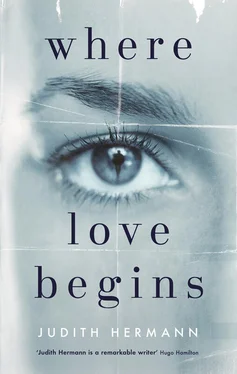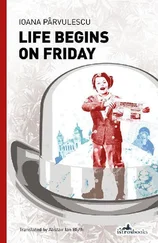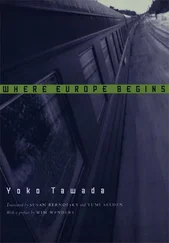Next day the stranger comes again, at the same time. He apparently knows when Stella is at home, and when she’s home alone. Stella is in the kitchen looking in the cabinet under the sink for the brush for Ava’s shoes when the doorbell rings, and even though she hadn’t been thinking of him at all, even though she never assumed that he would come back so soon — even though she had actually forgotten him, he immediately comes to mind again. She knows who’s ringing the bell. She knows that it’s not the postman, not a messenger, not her neighbour, not a child in need of a bicycle pump, unfortunately not the chimney sweep, and not the man from the gas company. She puts the little suitcase in which Jason keeps the shoe polish things down in front of the sink, and straightens up. Her knee joints crack as she stands up, and for a moment she feels dizzy. She goes out of the kitchen down the hall to the front door. Looking out of the window she takes hold of the intercom receiver; she says, Yes.
Yes, as she looks at the stranger standing on the street outside her garden gate in the same clothes he was wearing yesterday, his hands in his jacket pockets, and, as far as she can see at this distance, the same totally expressionless face as yesterday. She can’t really see his face, but his aura is expressionless, and the way he now leans down to the intercom, not taking his hands out of his jacket pockets nor looking in her direction, but rather keeping his face turned towards the pavement — his manner is so flat and toneless that it gives Stella the chills.
Hello. It’s me. I wanted to ask if maybe today you have time for a conversation.
No, Stella says. She feels her knees trembling; she is surprised at how quickly that can happen. Is she really trembling again? It’s true. She is trembling.
She says, No, I don’t. I don’t have time today. And tomorrow I won’t have any time either; on the whole, I don’t have any time. I’m sorry, excuse me.
The man outside on the street says, You really don’t have to excuse yourself. You really don’t need to do that. He stands there still leaning forward as he says it, looking at the grass between the paving stones. He coughs.
Stella hangs up the receiver.
This he seems to understand, he straightens up stretching a little; it almost looks as if he were yawning.
You really don’t need to do that. What is it that makes this remark such an impertinence? Why is this remark an effrontery behind which something else seems to be concealed. The word ‘threat’ comes to Stella’s mind like a warning. Her mouth is dry and her heart barely beating. She sees the stranger walk to the corner of the street. From Jason’s window she watches him smoking; she wishes he would turn around, just once, turn around and look towards Jason’s room, and she hisses it: Turn around. But clearly the stranger is the stronger one. He smokes, as deliberately as yesterday; then he flicks the finished cigarette onto the pavement and walks off.
*
Later, Stella can’t remember any more whether she didn’t say, after all, that she knew what she needed to do and what not. Did she say it? I know what I need to do and what I don’t, and then hung the receiver back up? Or did she only think it. Wasn’t she quick or aggressive enough to say it out loud? She cannot remember. But she remembers clearly the feeling of humiliation and her decision to let this be the last time she ever talks to that man. Not even to go to the door from now on when the bell rings. Going to the door twice was enough; there will be no third time, and it remains to be seen if he’ll even ring a third time.
*
That evening she locks the front door from the inside.
Waiting till Ava is asleep, she takes the telephone to the kitchen, but then changes her mind; she doesn’t call Jason after all. She sits at the table in the kitchen, reading the paper and drinking a beer she’s taken from the refrigerator; she reads a story about Calcutta and another one about Siberia and then something else. She looks up between the lines and sees herself from outside, from a point outside the house, a corner of the garden perhaps, from the fence, the high grass in the uncultivated meadow. She sees a woman sitting alone at a table under a lamp, reading.
*
That’s me, Stella thinks. That’s me. Stella.
Next morning the bell rings shortly before ten, and it rings as if it were a certainty that Stella wouldn’t come to the door. Casually, in passing. Much more briefly than yesterday or the day before yesterday. The ringing of someone who just wants to say, Here I am, I’m here, standing outside your door.
Stella sees him. She’s sitting upstairs in her room at her desk, and she sees him. She’s been sitting in her room at her desk by the window and waiting since returning home after taking Ava to kindergarten — the shift at Esther’s begins in an hour and a half. She saw him coming. He was coming from the left. Not from the direction of Main Street, from the shopping centre, from the bus route from the new development; he’s coming from the left, from her own neighbourhood. Appearing at the edge of her property, he walks at once both listlessly and purposefully along the fence, stops in front of the garden gate, turns and rings the bell, and almost simultaneously puts a hand into the inside pocket of the same old jacket and takes out something white, an envelope.
He lets the envelope drop into the mailbox attached to the fence and looks up towards Stella’s room. Then he crosses the street, turns into Forest Lane, heads down towards Main Street and disappears.
*
For a while Stella sits at her desk, leaning back, hands folded in her lap. A flock of sparrows flies up out of the trees in the garden across the way, as if hurled into the air by a large hand. Downstairs in the kitchen the gas hot water heater switches on and off again. Four minutes, five. Then she stands up.
The air in the garden outside is wonderful. It smells of late spring, sweet woodruff and boxwood. Postponing it is out of the question. Stella opens the mailbox and the white envelope drops into her hand like something that can’t be changed any more.
The envelope is of ordinary paper, precisely addressed. Stella’s first and last name, house number, street and postal code properly provided in a curving, feminine handwriting, a postage stamp, as if the sender had intended to have the post office deliver the letter, only to change his mind at the last moment. The stamp is neutral, inconspicuous, the head of a queen on a green background. Stella turns the letter over. It seems there’s nothing to hide; on the back are the sender’s name, house number, street and postal code written in the same matter-of-fact hand:
Mister Pfister.
Mister Pfister is the sender of the letter, and he lives, as Stella now reads, on the same street as she does. Seven or eight houses farther on; they are neighbours. It makes no sense to take a letter to the post office if you can deliver it yourself. Mr Pfister simply drops a letter like this into the mailbox personally; that’s no problem for him.
Stella doesn’t know her neighbours. People around here are extremely reserved; they make no effort to get to know each other. A female university student lives in the house next door with changing subtenants. In the house next to her, an Asian family with half-grown children; in the house across the way, a retired teacher; that’s as far as Stella has got. Mister Pfister’s being a neighbour narrows the radius from one moment to the next. She thought he would simply vanish again. She didn’t think that he was this close, had been all along, only a few houses farther on; that he lived here — just like her.
Читать дальше












